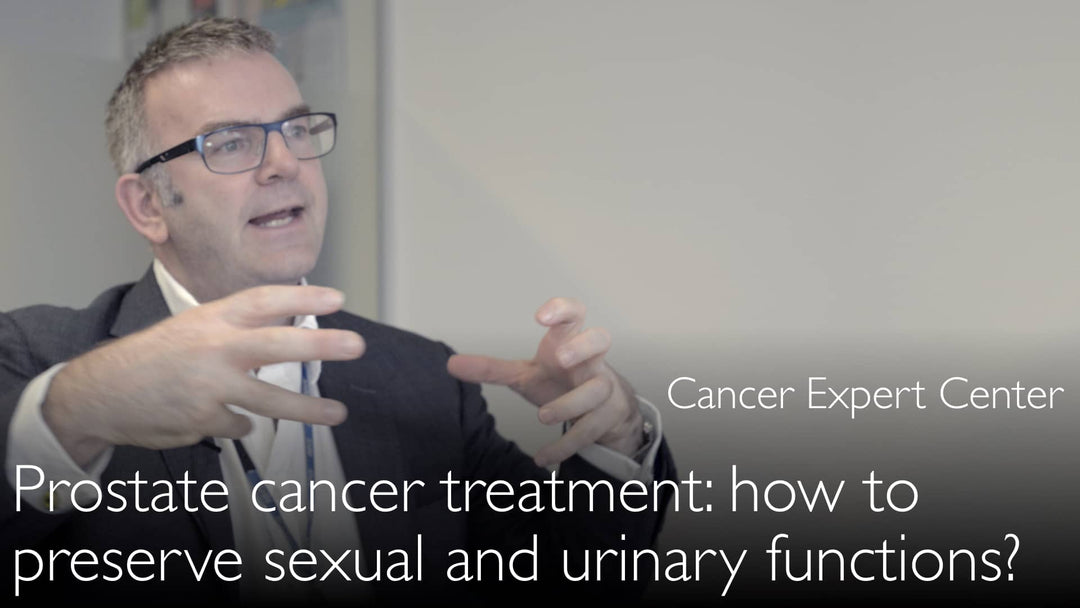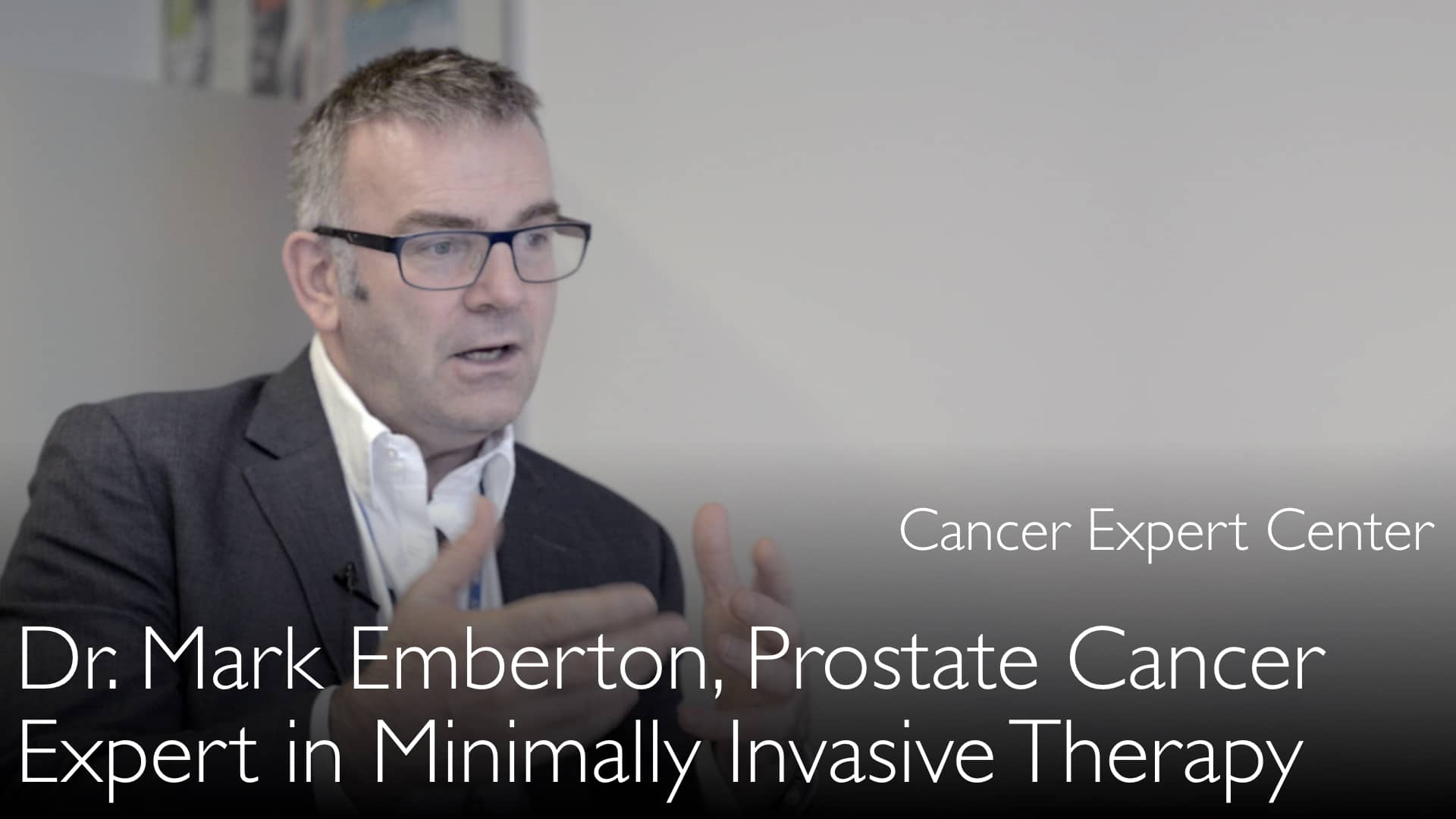前立腺がん治療の権威であるマーク・エンバートン医学博士によれば、焦点療法は組織温存型のアプローチとして、前立腺内のがん病変を的確に標的としつつ、90%以上の患者で性機能と尿失禁を維持しながら病変を根絶します。これにより治療効果が劇的に向上します。従来の治療法と比べて副作用が最小限に抑えられ、日帰り手術も可能です。
前立腺癌の局所療法:性機能と排尿機能の温存
セクションへ移動
前立腺癌治療の課題
前立腺癌の最適な治療法を選ぶには、根治を目指すことと、生活の質(QOL)に関わる重要な機能を温存することとのバランスが求められます。Mark Emberton医学博士は、この調整が泌尿器科医にとって臨床上最も複雑であり、同時に最もやりがいのある側面だと強調しています。主な目標は、治療後の性機能、尿失禁機能、直腸機能を保ちつつ、根治の可能性を最大限に高めることです。
Anton Titov医学博士は、治療選択を検討する患者にとって、このバランスが重要であると指摘しています。前立腺癌は独特の課題を抱えています。PIVOT試験をはじめとするいくつかの臨床試験では、特定の症例において、介入を行った場合と積極的監視を行った場合とで生存率にほとんど差が認められなかったからです。
治療比率の理解
治療比率(therapeutic ratio)の概念は、前立腺癌治療の意思決定において中心的な役割を果たします。Mark Emberton医学博士によれば、治療比率とは、利益をもたらす確率と害を及ぼす確率の比を表します。前立腺癌ではこの比率が特に低く、多くの患者が治療の副作用を経験する一方で、明らかな生存利益を得られる患者は比較的少数であることを意味します。
この厳しい現実が、医学界に前立腺癌診療への新たなアプローチの開発を促してきました。前立腺全摘除術や放射線療法といった従来の根治的治療は、前立腺周辺の重要な構造に影響を及ぼし、勃起機能、尿失禁機能、腸機能に合併症を引き起こすことが少なくありません。
MRIが変革する前立腺癌診療
高品質なMRI画像診断の登場は、前立腺癌のリスク層別化と治療計画に革命をもたらしました。Mark Emberton医学博士は、MRI技術により、臨床医が前立腺全体を治療する方針から、その中にある癌だけを標的にする方針へ移行できるようになったと指摘します。この精密さによって、前立腺の構造や重要な神経、血液供給、周辺組織を温存することが可能になりました。
癌の正確な位置と範囲を特定することで、MRIガイド下治療は、勃起機能を司る神経血管束、禁制を維持する尿道括約機構、腸機能に関わる直腸壁の保護に役立ちます。この画像診断の進歩が、前立腺癌治療における組織温存的アプローチの基盤を築いています。
局所療法とは
局所療法(focal therapy)は、組織温存療法または組織選択的療法とも呼ばれ、前立腺癌治療におけるパラダイムシフトを象徴するものです。Mark Emberton医学博士は、このアプローチを、前立腺内の癌性領域のみを標的とし、健康な組織を温存する方法と説明します。この方法は特に、泌尿生殖器機能の維持に不可欠な神経、血液供給、直腸、肛門括約筋、膀胱へのダメージを軽減することを目的としています。
局所療法の開発は過去6~7年にわたり広範な研究の対象となっており、臨床試験で安全性と有効性の両方が実証されています。Mark Emberton医学博士とそのチームは、このアプローチがQOLを維持しながら効果的に癌を根絶できることを証明することに注力してきました。
局所療法の成功率と利点
現在のエビデンスは、適切に選択された前立腺癌患者における局所療法の印象的な成果を示しています。Mark Emberton医学博士は、このアプローチにより約90%の患者で癌を根絶できると報告しています。一部の患者では2回目の治療セッションが必要となる場合があり、ごく少数では癌が持続する場合に手術や放射線療法に移行する必要があるかもしれません。
機能的転帰は特に顕著です。局所療法は日帰り手術として実施され、患者は当日中に帰宅できます。最も重要なのは、Mark Emberton医学博士が患者に「失禁は起こらない」と自信を持って伝えられ、治療後も90~95%の確率で勃起機能を維持できると説明できることです—これは従来療法に比べて劇的な改善です。
前立腺癌患者の長期予後
局所療法は優れた短期成績を示していますが、長期にわたる癌コントロールのデータはまだ発展途上です。Mark Emberton医学博士は、このアプローチが10~15年の生存データを得るほど長く実施されていないことを認めており、根治的可能性を最終確認するにはこれが必要だと述べています。主要エンドポイントは、患者が前立腺癌で死亡することなく長く生きる手助けをすることに変わりありません。
しかし、Mark Emberton医学博士は、局所療法が前立腺癌治療の副作用プロファイルを劇的に改善したことには疑いの余地がないと強調します。この組織温存的アプローチは、治療利益とQOL温存のバランスを取る上で大きな進歩を代表し、男性に従来の根治的治療に対する有力な選択肢を提供します。
全文書き起こし
Anton Titov医学博士: 性機能を温存する最適な前立腺癌治療法はどのように選ぶべきですか?前立腺癌における局所療法(Focal Therapy)または組織温存療法(Tissue Preserving Therapy)とは何ですか?前立腺癌治療におけるリスクと利益のバランスについて教えてください。
前立腺癌治療を受ける患者にとって、性機能、膀胱機能、直腸機能の温存が非常に重要な課題であることは既に議論されました。根治の可能性と治療結果を最大化する目標を持ちながら、かつ治療後も性機能と排尿機能が保たれる治療法をどのように選択されますか?
Mark Emberton医学博士: はい、これは非常に良い質問であり、これが課題です。これは臨床医として得られる大きなやりがいです。私たちは患者がこの非常に複雑な前立腺癌の意思決定を乗り越えるのを助けようとします。
前立腺癌は確かに課題を提示します。手術と経過観察を比較する前立腺癌試験が発表されていますが、生存率に実質的な差はありません。PIVOT前立腺癌試験はその好例です。多くの理由で批判されており、結果が真実ではないかもしれません。しかしそれでも、これが私たちが持つ結果です。
介入と非介入の間に差があるとしても、それは大きな差ではないでしょう。差を示すには、10年にわたって何千人もの前立腺癌患者が必要になります。
そこで医学では治療比率(therapeutic ratio)について話します。これは利益をもたらす確率と害を及ぼす確率の比です。前立腺癌の治療比率は低いです。つまり、多くの前立腺癌患者に害を及ぼす可能性がある一方で、利益を得る患者は多くないのです。これは厳しい決断です。
それが私たちに前立腺癌診療への異なるアプローチを考え出そうとさせた理由です。MRIの出現によりそれを可能にできました。MRIは、この対話の前半で話したより良いリスク層別化の実現に役立ちます。
私たちは前立腺そのものを治療することから、前立腺内の癌を治療することへ移行しました。前立腺の構造を温存できるため、神経、血液供給、直腸、肛門括約筋、膀胱に生じる損傷を軽減できます。
これらすべてが泌尿生殖器機能、性機能、および排尿機能を司る重要な構造物です。このアプローチを私たちは局所療法(Focal Therapy)、または組織温存療法(Tissue Preserving Therapy)、組織選択的療法(Tissue-selective Therapy)と呼んでいます。
この前立腺癌治療は、私たちが過去6~7年間取り組んできた研究の対象です。男性を臨床試験を通して、組織温存療法が安全であることを証明しています。前立腺癌を根絶できることを証明しなければなりません。これらの重要な機能に影響を与えずにそれができることを証明しなければなりません。
これまでの私たちの研究に対する答えは、はい、可能だということです。これらの前立腺癌患者の約90%で癌を根絶できます。一部の患者では2回目の治療が必要です。また一部の前立腺癌患者では手術や放射線療法に進む必要があるかもしれません。
しかし大多数は問題なく、日帰り前立腺癌治療処置として実施できます。わずか1日で終わり、失禁に影響を与えず、ほとんどの男性が良好な性機能を維持できます。治療後90~95%の男性が維持できるという意味です。これは以前の前立腺癌治療から見て大きな変化です。
Anton Titov医学博士: つまり局所療法は、前立腺癌治療の治療比率を、利益と副作用リスクのより良いバランスに改善できるということですね。
Mark Emberton医学博士: はい、前立腺癌治療側面は仮定です。なぜなら長期追跡調査をまだ持っていないからです。最終的には長く生きて前立腺癌で死亡しないことが重要です。必要な10~15年ほどこれは行っていません。
しかし、私たちが前立腺癌治療の副作用プロファイルを劇的に変えたことに疑問の余地はありません。前立腺局所療法について話すとき、私は誰かの目を見て「あなたは失禁しません」と言えます。目を見て「90%から95%の確率で勃起機能を維持できるでしょう」と言えます。





